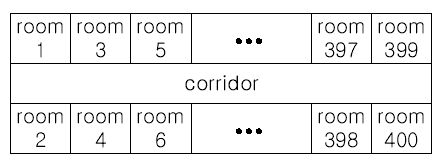标签:
HDOJ题目地址:传送门
Moving Tables
Time Limit: 2000/1000 MS (Java/Others) Memory Limit: 65536/32768 K (Java/Others)
Total Submission(s): 28729 Accepted Submission(s): 9435
Problem Description
The famous ACM (Advanced Computer Maker) Company has rented a floor of a building whose shape is in the following figure.

The floor has 200 rooms each on the north side and south side along the corridor. Recently the Company made a plan to reform its system. The reform includes moving a lot of tables between rooms. Because the corridor is narrow and all the tables are big, only
one table can pass through the corridor. Some plan is needed to make the moving efficient. The manager figured out the following plan: Moving a table from a room to another room can be done within 10 minutes. When moving a table from room i to room j, the
part of the corridor between the front of room i and the front of room j is used. So, during each 10 minutes, several moving between two rooms not sharing the same part of the corridor will be done simultaneously. To make it clear the manager illustrated the
possible cases and impossible cases of simultaneous moving.

For each room, at most one table will be either moved in or moved out. Now, the manager seeks out a method to minimize the time to move all the tables. Your job is to write a program to solve the manager’s problem.
Input
The input consists of T test cases. The number of test cases ) (T is given in the first line of the input. Each test case begins with a line containing an integer N , 1<=N<=200 , that represents the number of tables to move. Each of the following N lines contains
two positive integers s and t, representing that a table is to move from room number s to room number t (each room number appears at most once in the N lines). From the N+3-rd line, the remaining test cases are listed in the same manner as above.
Output
The output should contain the minimum time in minutes to complete the moving, one per line.
Sample Input
3
4
10 20
30 40
50 60
70 80
2
1 3
2 200
3
10 100
20 80
30 50
Sample Output
题意:在一个狭窄的走廊里将桌子从一个房间移动到另一个房间,走廊的宽度只能允许一个桌子通过。给出t,
表示有t组测试数据。再给出n,表示要移动n个桌子。n下面有n行,每行两个数字,表示将桌子从a房间
移到b房间。走廊的分布图如一图所示,每移动一个桌子到达目的地房间需要花10分钟,问移动n个桌子
所需要的时间。
解题思路:若移动多个桌子时,所需要经过的走廊没有重合处,即可以同时移动。若有一段走廊有m个桌子都
要经过,一次只能经过一个桌子,则需要m*10的时间移动桌子。设一个数组,下标值即为房间号。
桌子经过房间时,该房间号为下标对应的数组值即加10。最后找到最大的数组值,即为移动完桌子
需要的最短时间。
#include<cstdio>
#include<cstring>
#include<algorithm>
using namespace std;
int main(){
int t,n,count[410],i,start,end,k;
scanf("%d",&t);
while(t--){
scanf("%d",&n);
memset(count,0,sizeof(count));
while(n--){
scanf("%d%d",&start,&end);
//可能出发位置比目的地房间大。
if(start>end){
//无论大小,我们都可以看做从小的房间移动到大的房间
k=start;
start=end;
end=k;
}
if(start%2==0)//考虑实际情况,出发房间为偶数是减一,可参照题中给出的图一
start-=1;
if(end%2==1)//目的地房间为奇数时加一
end+=1;
for(i=start;i<=end;++i)
count[i]+=10;
}
printf("%d\n",*max_element(count,count+400));//STL中寻找数列最大值函数
}
return 0;
}
参考博客:传送门
ACM--移动桌子--贪心--HDOJ 1050--Moving Tables
标签:
原文地址:http://blog.csdn.net/qq_26891045/article/details/51519759

